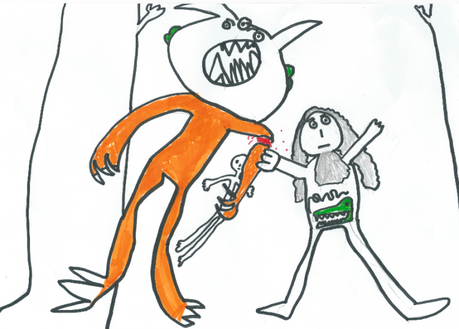My dad told me about a series of comic books that were available when he was young—comics based on the plots of books commonly assigned to schoolchildren, which served as CliffNotes in those pre-Internet days when plagiarism generally meant that you copied either from a classmate or from the saved papers of students a year or two ahead of you. I’ve never actually seen one of those comic books, but I always liked the idea of them, even though I’ve pretty much always been the sort of student who reads the book.
(Except for The Martian Chronicles, which was assigned in 9th grade and which I simply did not read.)
Yet even though I’m generally a fan of reading the whole, real book before seeing the movie (or taking the exam)—I read, and loved, an unabridged translation of Les Miserables as a teenager—I’ve discovered that shortened and child-friendly adaptations of classic books can be very good things. I mean, I’m no expert in reading instruction or in child development or in anything else in particular, come to think of it, but there is something about allowing children to absorb great stories, even in a sketched-out form, that seems to be pretty powerful.
A few years ago, my husband started telling the children a child-friendly version of The Lord of the Rings, and they continue to ‘play the story’ in Lego and out in the yard, mulling over the endurance of Frodo, the faithfulness of Sam, the pitiable nature of Gollum, and the dangerous allure of the ring of power. About a year ago, my father read them a children’s adaptation of Moby-Dick, took them to the Sag Harbor Whaling Museum, and watched the classic film (with Gregory Peck). Again, the story figures into their thinking and playing still.
And recently, I read them a children’s version of the epic poem Beowulf, one of the oldest surviving works of literature in (Old) English. They could hardly wait for each successive chapter, and they cried real tears over the death of the old knight Beowulf. Don’t tell them I told you that.

Graeme’s version of Beowulf v. Grendel
This is not at all to slight classic children’s literature, which I also love (I cried reading Karen Swallow Prior’s chapter on Charlotte’s Web in her literary memoir Booked), but only to say that even as children can absorb stories from the Bible in simplified form long before they can understand theology or read passages from the Good Book itself, they can meaningfully encounter great stories in ways that open up their imagination and creativity long before they’re ready to read Melville—and even if they’re never ready to read Melville.
In Experiment in Criticism, C.S. Lewis wrote that one way to know you’ve encountered ‘myth’ (by which he meant not not true but rather a transcendently powerful story) when even reading the bare bones of the plot moves you in some way, or, in his words, a myth has “value in itself –a value independent of its embodiment in any literary work.” I think that when my children take little child-sized bites of Beowulf, Moby-Dick, Lord of the Rings, and Arthurian legend, it begins to open up the back of the wardrobe.
